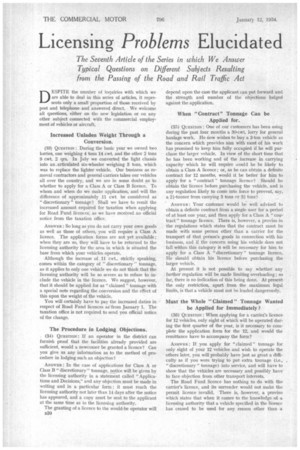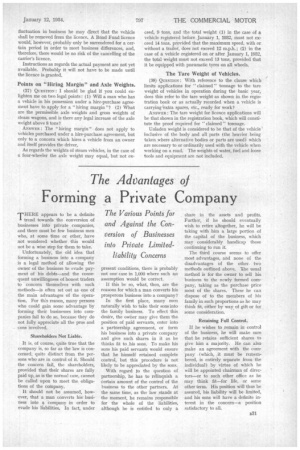Licensing Problems Elucidated
Page 48

Page 49

If you've noticed an error in this article please click here to report it so we can fix it.
The Seventh Article of the Series in which We Answer Typical Questions on Different Subjects Resulting from the Passing of the Road and Rail Traffic Act
DESPITE the number of inquiries with which we are able to deal in this series of articles, it represents only a small proportion of those received by post and telephone and answered direct. We welcome all questions, either on the new legislation or on any other subject connected with the commercial employment of vehicles or aircraft.
Increased Unladen Weight Through a Conversion.
(33) QuesTioN : During the basic year we owned two lorries, one weighing 4 tons 14 cwt. and the other 2 tons 9 cwt. 2 qrs. In July we converted the light chassis into an .articulated six-wheeler weighing 3 tons, which was to replace the lighter vehicle. Our business as removal contractors and general carriers takes our vehicles all over the country, and we are in some doubt as to whether to apply for a Class A or Class B licence. To whom and when do we make application, and will the difference of approximately 11 cwt. be considered as " discretionary " tonnage? Shall we have to remit the increased amount required for taxation when applying for Road Fund licences, as we have received no official notice from the taxation office.
ANSWER So long as you do not carry your own goods as well as those of others, you will require a Class A licence. The application forms are not yet available ; when they are so, they will have to be returned to the licensing authority for the area in which is situated the base from which your vehicles operate.
Although the increase of 11 cwt., strictly speaking, comes within the category of " discretionary " tonnage, as it applies to only one vehicle we do not think that the licensing authority will be so severe as to refuse to include the vehicle in the licence. We suggest, however, that it should be applied for as " claimed " tonnage with a special note regarding the conversion and the effect of this upon the weight of the vehicle.
You will certainly have to pay the increased duties in respect of Road Fund licences as -from January I. The taxation office is not required to send you official notice of the change.
The Procedure in Lodging Objections.
. (34) Quasriora : If an operator in the district can furnish proof that the facilities already provided are sufficient, would a newcomer be granted a licence? Can you give us any information as to the method of procedure in lodging such an objection?
ANSWER: In the case of applications for Class A or Class B " discretionary " tonnage, notice will be given by the licensing authority in a statement called "Applications and Decisions," and any objection must be made in writing and in a particular form ; it must reach the licensing authority not later than 14 days after the notice has appeared, and a copy must be sent to the applicant at the same time as to the licensing authority. The granting of a licence to the would-be operator will n30 depend upon the case the applicant can put forward and the strength and number of the objections lodged against the application.
When "Contract" Tonnage Can be Applied for.
(35) Quasriosr: One of our customers has been using during the past four months a 30-cwt, lorry for general haulage work. He now wishes to buy a 3-ton vehicle as the concern which provides him with most of his work has promised to keep him fully occupied if he will purchase the larger vehicle. In view of the short time that he has been working and of the increase in carrying capacity which he will require would he be likely to obtain a Class A licence; or, as he can obtain a definite contract for 12 months, would it be better for him to apply for a " contract " tonnage licence? Should he obtain the licence before purchasing the vehicle, and is any regulation likely to come into force to prevent, say, a 23-tonner from carrying 3 tons eor 3.3 tons?
ANSWER: Your customer would be well advised to obtain a definite contract from a single user for a period of at least one year, and then apply for a Class A " contract " tonnage licence. There is, however, a proviso in the regulations which states that the contract must be made with some person other than a carrier for the transport of that person's goods in connection with his business, and if the concern using his vehicle does not fall within this category it will be necessary for him to apply for a Class A " discretionary " tonnage licence. He should obtain his licence before purchasing the larger vehicle.
At present it is not possible to say whether any further regulation will be, made limiting overloading ; so far, there is no indication of this being done. At present the only restriction, apart from the maximum legal limits, is that a vehicle must not be loaded dangerously.
Mast the Whole "Claimed" Tonnage Wanted . be Applied for Immediately ?
(36) QUESTION: When applying for a carriea's licence for 12 vehicles, only eight of which will be operated during the first quarter of the year, is it necessary to complete the application form for the 12, and would the remittance have to accompany the form?
ANSWER: If you apply for " claimed " tonnage for only eight of your 12 vehicles and wish to operate the others later, you will probably have just as great a difficulty as if you were trying to put extra tonnage (i.e., " discretionary " tonnage) into service, and will have to show that the vehicles are necessary and possibly have to face objection from other transport interests.
The Road Fund licence has nothing to do with the carrier's licence, and its surrender would not make the permit licence invalid. There is, however, a proviso which states that when it comes to the knowledge of a. licensing authority that a vehicle specified in the licence has ceased to be used for any reason other than a fluctuation in business he may direct that the vehicle shall be removed from the licence. A Road Fund licence would, however, probably only be surrendered for a certain period in order to meet business differences, and, therefore, there would be no risk of the cancelling of the carrier's licence.
Instructions as regards the actual payment are not yet available. Probably it will not have to be made until the licence is granted.
Points on "Hiring Margin" and Axle Weights.
(37) QUESTION: I should be glad if you could enlighten me on two legal points : (1) Will a man who has a vehicle in his possession under a hire-purchase agreement have to apply for a " hiring margin "? (2) What are the permissible axle weights and gross weights of steam wagons, and is there any legal increase of the axle weight above 8 tons?
ANSWER: The "hiring margin" does not apply to vehicles purchased under a hire-purchase agreement, but only to a concern which hires a vehicle from an owner and itself provides the driver.
As regards the weights of steam vehicles, in the case of a four-wheeler the axle weight may equal, but not ex
ceed, tons, and the total weight (1) in the case of a vehicle registered before January 1, 1932, must not exceed 14 tons, provided that the maximum speed, with or without a trailer, does not exceed 12 m.p.h. ; (2) in the case of a vehicle registered on or after January 1, 1932, the total weight must not exceed 13 tons, provided that it be equipped with pneumatic tyres on all wheels.
The Tare Weight of Vehicles.
(38) QUESTION: With reference to the clause which limits applications for " claimed " tonnage to the tare weight of vehicles in operation during the basic year, does this refer to the tare weight as shown in the registration book or as actually recorded when a vehicle is carrying extra spares, etc., ready for work?
ANSWER: The tare weight for licence applications will be that shown in the registration book, which will constitute the proof required for " claimed " tonnage.
Unladen weight is considered to be that of the vehicle' inclusive of the body and all parts (the heavier being taken where alternative bodies or parts are used) which are necessary to or ordinarily used with the vehicle when working on a road. The weights of water, fuel and loose tools and equipment are not included,




































































































